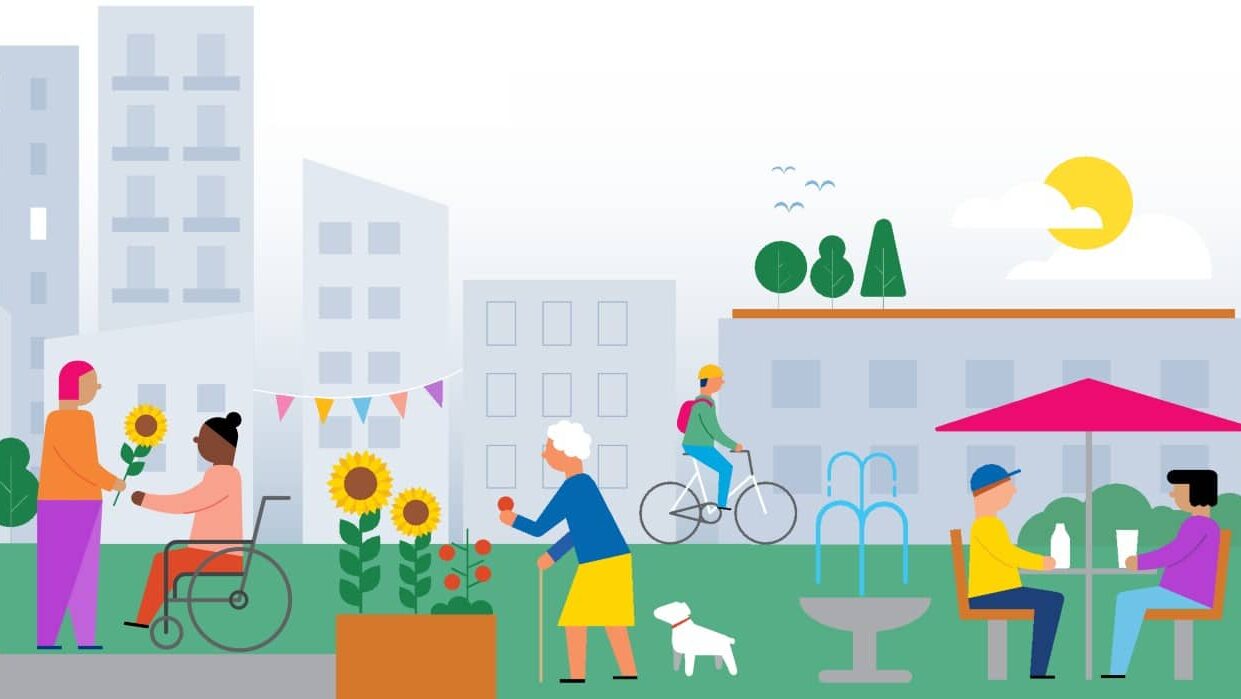
Housing That Connects Us
9:30 – 11 a.m. PDT | Online
Hear from local experts about the health and climate rationale for intergenerational ‘sociable’ design.
Join Hey Neighbours Collective to hear from two local experts and contribute your own insights about the connection between housing and wellbeing.
As Canadian cities densify, multi-unit housing is becoming a dominant form for many – if not most – households. These housing types, however, sometimes offer lower levels of connection between neighbours and a reduced feeling of community. This is not a minor issue: our connections with neighbours – and with our immediate neighbourhood – impact our health in significant and measurable ways.
But multi-unit housing is not inherently isolating: thoughtful design and programming can help to build community, neighbourly connections and resilience. Great examples exist but they are too often the exception, not the rule.
In a time of polycrisis (affordability, housing, climate change, growing inequity, loneliness etc) we need to pull together across sectors to mainstream socially connected, resilient, and inclusive multi-unit housing.
Moderator
Michelle Hoar, Project Director, Hey Neighbour Collective
Speakers
Madeleine Hebert, Happy Cities
Madeleine is a senior housing specialist with Happy Cities. She leads housing projects at Happy Cities, working with professionals and communities to boost social connectedness, resilience, and wellbeing through intentional design and policies. Her work promotes collaborative approaches and ensures that spaces provide equitable opportunities for everyone. Madeleine has experience designing educational facilities and housing projects across the province of BC. Her educational background includes a multidisciplinary Environmental Design degree from the University of British Columbia and a Master of Architecture from Carleton University.
Laura Chow, Vancouver Coastal Health
Laura Chow is a Senior Planner with Vancouver Coastal Health’s Healthy Environments & Climate Change team. A believer that our environments shape our opportunities, behaviours, and exposures, Laura brings a public health and equity lens to community and strategic planning. Her work is focused on mitigating the harms of climate change on our health and well-being, by not only reducing harms to our health, but also by creating environments that simultaneously allow us to be healthy socially, mentally, and physically.
Context
Researchers have been learning about the health and wellbeing impacts of loneliness, social isolation and declining feelings of community belonging for many years now. The evidence is conclusive: social connectedness and a sense of community belonging are integral elements of personal and collective physical and mental health across all demographics. People with weak social connections have a 50% greater risk of death than those with stronger connections; an effect on mortality as strong as smoking 15 cigarettes a day.
Locally, Vancouver Coastal Health and Fraser Health have collaborated on My Health My Community surveys of tens of thousands of British Columbians. Learn more about their findings and recommendations for how positive changes in our built environment can contribute towards mitigating worrisome trends.
Hey Neighbour Collective (HNC) formed in 2019 in response to the type of research mentioned above, with a focus on ways of building social connectedness between neighbours within multi-unit housing. In late 2020 HNC submitted a discussion paper to the Metro 2050 Regional Growth Strategy consultations: “Developing Truly Complete Communities: Social equity, social connectedness, and multi-unit housing in an age of public health and climate crises.”
One of the recommendations within the report that had strong interest from those consulted was that Metro Vancouver member municipalities should develop design guidelines and incentives for multi-unit housing that fosters neighbourly social connections. In collaboration with long-time partner Happy Cities, HNC hosted cross-sectoral workshops in September 2021 and June 2022 to further this idea.
These efforts yielded fruit. Metro 2050 was approved in February 2023 with a specific requirement for its 21 member municipalities to show how their “local actions and policies” will contribute to “increased social connectedness in multi-unit housing.”
There are many ways to support social connectedness in multi-unit housing. But one of the most powerful is to design housing from the outset to intentionally foster connection. A strong physical foundation supports both organic and programmatic forms of neighbourly interactions, connections and systems of mutual support.
Over the next year, Hey Neighbour Collective, Happy Cities and SFU are collaborating on a project entitled Building Social Connections: Housing design policies to support wellbeing for all, which will support six Metro Vancouver jurisdictions to co-create new guidelines and incentives informed by research and best practices from near and far.
Sponsors
This project received funding from Canada Mortgage and Housing Corporation and the views expressed are those of the author and CMHC accepts no responsibility for them.
About Hey Neighbour Collective
Hey Neighbour Collective (HNC) brings together landlords and housing operators, non-profits, researchers, local and regional governments, housing associations and health authorities. Together with residents of multi-unit housing, these HNC partners take action to alleviate loneliness and social isolation through building social connectedness, resilience, and capacity for neighbourly support and mutual aid.
HNC is housed at the SFU Morris J Wosk Centre for Dialogue. Key academic research partners include SFU Urban Studies, Gerontology and Health Sciences. Happy Cities is also a key research and engagement partner and Vancouver Coastal Health is one of a number of ‘learning network’ partners.
About Happy Cities
Happy Cities is an urban planning, design, and research firm that uses an evidence-based approach to create happier, healthier, more inclusive communities. We harness the science of wellbeing to advise housing providers, municipalities, developers, and organizations around the world on how to design buildings and urban spaces that support people’s social and physical wellbeing.




